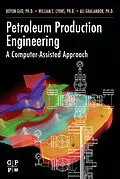Petroleum Production Engineering, A Computer-Assisted Approach provides handy guidelines to designing, analyzing and optimizing petroleum production systems. Broken into four parts, this book covers the full scope of petroleum production engineering, featuring stepwise calculations and computer-based spreadsheet programs. Part one contains discussions of petroleum production engineering fundamentals, empirical models for production decline analysis, and the performance of oil and natural gas wells. Part two presents principles of designing and selecting the main components of petroleum production systems including: well tubing, separation and dehydration systems, liquid pumps, gas compressors, and pipelines for oil and gas transportation. Part three introduces artificial lift methods, including sucker rod pumping systems, gas lift technology, electrical submersible pumps and other artificial lift systems. Part four is comprised of production enhancement techniques including, identifying well problems, designing acidizing jobs, guidelines to hydraulic fracturing and job evaluation techniques, and production optimization techniques. - Provides complete coverage of the latest techniques used for designing and analyzing petroleum production systems - Increases efficiency and addresses common problems by utilizing the computer-based solutions discussed within the book - Presents principles of designing and selecting the main components of petroleum production systems
Autorentext
Dr. Boyun Guo is well known for his contributions to the energy industry in multiphase flow in pipe systems and horizontal well engineering. He is currently a Professor at the University of Louisiana at Lafayette in the Petroleum Engineering Department and Director of the Center for Optimization of Petroleum Systems (COPS). He has over 35 years of work experience in the oil and gas industry and academia, and has previously worked for New Mexico Tech, New Mexico Petroleum Recovery Research Center, and Edinburgh Petroleum Services. He holds a BS degree in Petroleum Engineering from Daqing Petroleum Institute of China, MS degree in Petroleum Engineering from Montana College of Mineral Science and Technology, and a PhD in Petroleum Engineering from New Mexico Institute of Mining and Technology. Dr. Guo has authored over a hundred papers, served on many association committees, and published 13 books of which 10 of those reside with Elsevier.
Inhalt
Preface
List of Symbols
List of Tables
List of Figures
Part I: Petroleum Production Engineering Fundamentals:
Chapter 1: Petroleum Production System
Chapter 2: Properties of Oil and Natural Gas
Chapter 3: Reservoir Deliverability
Chapter 4: Wellbore Performance
Chapter 5: Choke Performance
Chapter 6: Well Deliverability
Chapter 7: Forecast of Well Production
Chapter 8: Production Decline Analysis
Part II: Equipment Design and Selection
Chapter 9: Well Tubing
Chapter 10: Separation Systems
Chapter 11: Transportation Systems
Part III: Artificial Lift Methods
Chapter 12: Sucker Rod Pumping
Chapter 13: Gas Lift
Chapter 14: Other Artificial Lift Methods
Part IV: Production Enhancement
Chapter 15: Well Problem Identification
Chapter 16: Matrix Acidizing
Chapter 17: Hydraulic Fracturing
Chapter 18: Production Optimization
Appendix A: Unit Conversion Factors
Appendix B: The Minimum Performance Properties of API Tubing
